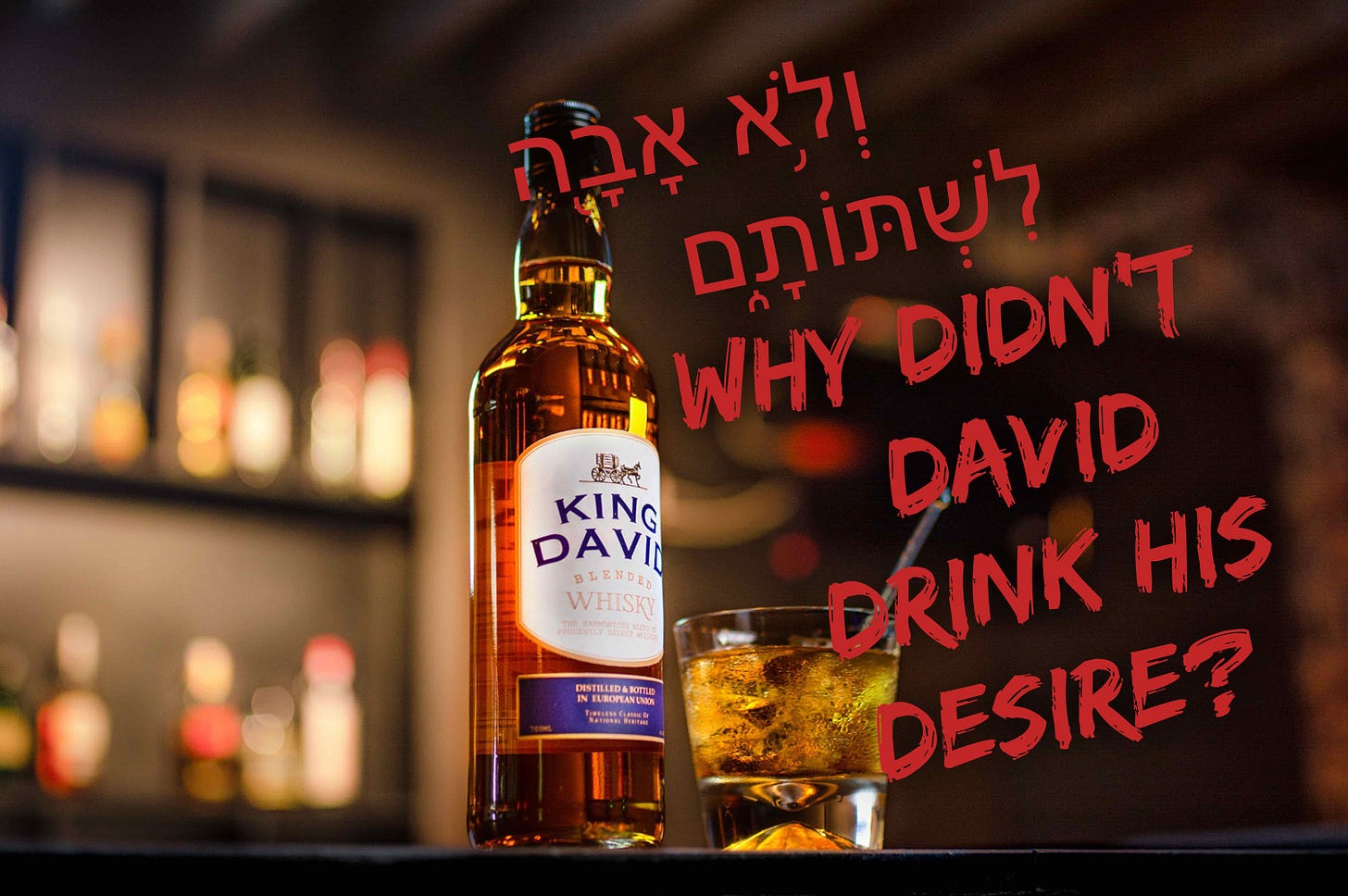Some strange stories have lives of their own. Some even become songs.
In 1970, Akiva Nof, a young Israeli songwriter wrote a ballad based on an obscure scene in today’s chapter that became an instant Israeli pop hit, not just because it’s (still) pretty good but also because of its inaugural performance in which the three male singers showed off more than impressive vocals. The Hebrew song, Water for King David, was performed by the male comic trio HaGashash -HaHiver “the pale tracker”, who wore very short biblical style skirts that left little to the imagination each time they raised their hands.
But it’s not just what’s below these guys’ belts that caught the audience's attention but the message of the lyrics - meaningful to Israeli audiences in the first years following the 1967 Six-Day-War. The song captured both the sense of nostalgia and longing for the places and memories of long ago, as well as the danger that comes with crossing the lines to get back to what may maybe best remain a dream and not reality - with a heavy and sometimes questionable price tag.
The song picks up the story in which David, still on the run and not yet a king, desires to drink water from the well of his childhood - in Bethlehem. The only problem is that at that time Bethlehem was under Philistine occupation and off limits. To satisfy their leader’s wish, three of his heroic warriors smuggle across enemy lines risking their lives, returning triumphant with a pitcher of cold well water from the center of town.
What David does with the water is surprising.
But before we get there - let’s take a look at the modern mythic twist that took the brief and cryptic passage from today’s chapter as a spin about heroic journeys and macho military men - but not without complexity. Here’s an English translation:
“And David thirsted for water
from the well in the hands of the Philistines.
To fulfill his wish
three heroes went forth.
They hurried to Bethlehem
to draw from the well.
On the way they told each other
tales of valor.
Said one of them:
"Listen! A mountain barred the way -
I laid my hand on it and
the mountain gave way.
The second said:
"Listen! A river blocked my path.
I raised my voice and -
the river stopped."
The third without a word
cleft the Philistine camp
and carried off the well and all its water
on his back.
Then David sang a song
to the three heroes.
They added a verse to the Bible
and since then we sing -
Water for David the King!
The modern Israeli version favors the silent hero who uproots the well over the two others who stop mountains and rivers and boast about it. But all three represent the ethos of the strong soldiers who risk lives for the longed for biblical land, no matter the cost. Bethlehem, then just recently under Israeli occupation, became the symbol for both the longed for landscape - and the risk of return to drink water from its well.
In the original story, David himself sends a message to his soldiers, preventing them from excessive risks and tricks for the sake of hubris or desire. Instead of drinking the water he so longer for he pours them on the altar as an act of sacrificial libation:
וַיֹּ֡אמֶר חָלִ֩ילָה֩ לִּ֨י יְהֹוָ֜ה מֵעֲשֹׂ֣תִי זֹ֗את הֲדַ֤ם הָאֲנָשִׁים֙ הַהֹלְכִ֣ים בְּנַפְשׁוֹתָ֔ם וְלֹ֥א אָבָ֖ה לִשְׁתּוֹתָ֑ם אֵ֣לֶּה עָשׂ֔וּ שְׁלֹ֖שֶׁת הַגִּבֹּרִֽים׃
“No, he said, “God forbid that I should do this! Can I drink the blood of the men who went at the risk of their lives?” So he would not drink it.
Such were the exploits of the three warriors.”
The chapter concludes with the lists of all the heroic men who served David, some of them known and others less so. The last one on the list, #37 is puzzling - Uriah the Hittite, who was sent to die on the frontlines so that David can wed Bathsheba, the pregnant widow-wife. Despite David’s big words - Uriah was a loyal fighter whose blood meant not as much as the water his wife used to bathe herself on her Jerusalem roof.
With one chapter, and one crisis left in the Book of Samuel, we are almost ready to bid farewell to the king whose thirst knew so little bounds.
Below the Bible Belt: 929 chapters, 42 months, daily reflections.
Become a free or paid subscriber and join Rabbi Amichai’s 3+ years interactive online quest to question, queer + re-read between the lines of the entire Hebrew Bible.
Enjoy daily posts, weekly videos and monthly learning sessions. 2022-2025.
How can a closer and critical reading of this cornerstone of our culture help us rethink our values and live more honest, happy, healthy lives?
#Samuel #Samuel2 #Samuel2:23 #Shmuel #BooksofSamuel #Prophets #Neviim #Hebrewbible #whowrotethebible? #Tanach #hebrewmyth #929 #hiddenbible #sefaria #labshul #belowthebiblebelt929 #postpatriarchy #patriarchy #Rizpahbatayah #Bethlehem #KingDavid #David’swarriors #waterfromthewell #sixdaywar #occupation #palestine #HouseofDavid #desire #nostalgia #הגששהחיוור #מיםלדודהמלך


